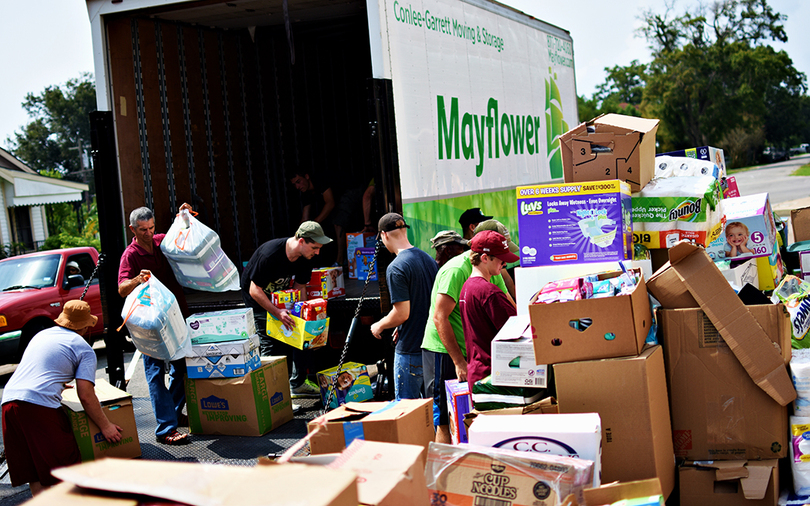Syracuse community organizes donations for residents hit hard by Harvey

A student organization from Texas A&M University coordinates Hurricane Harvey relief efforts. Courtesy of #BTHOharvey
Groups in Syracuse are organizing outreach and donation opportunities to assist relief efforts in Houston, which was devastated by record-breaking rainfall after Hurricane Harvey slammed into the Texas coastline near the end of August.
Harvey, which was downgraded to a tropical storm as it moved across southern Texas, dropped more than 20 trillion gallons of rainfall, making it the strongest hurricane to affect the United States since 2004. It resulted in the deaths of at least 45 people and $125 billion in damages.
Harvey’s emotional toll has resonated far and wide. People across the U.S. have made financial and material contributions in support of Houston residents.
Syracuse is no exception. Multiple organizations in the Salt City are coordinating opportunities to donate or volunteer in areas hit by the storm.
Brian Konkol, dean of Syracuse University’s Hendricks Chapel, is organizing Hurricane Harvey outreach efforts at the university.
“Houston’s in for the long haul,” Konkol said. “It’s not just the next few weeks.”
SU’s outreach efforts will focus on how to best help Houston residents in the long term, not just during the fall semester, Konkol said.
In terms of immediate action, Hendricks will not accept material donations such as care packages or food. In an SU News release, Konkol provided a vetted list of nine organizations people could donate to, though.
The American Red Cross, Catholic Charities, Houston Food Bank and SPCA of Texas, among others, were included on the list.
“There’s a natural desire to want to send physical objects — whether it’s clothes, diapers. We made a decision to really try to discourage (that) in our communication,” Konkol said.
That’s because material donations require human labor which can delay urgent relief efforts, while financial contributions are “fast, flexible and most importantly, far more effective,” according to the news release.
Fleet Feet Sports is one corporation that said it put in the time to sort and send physical donations to Houston. Store locations across the country collected gently-used shoes over Labor Day weekend.
Amber Gray, operations manager for a Syracuse Fleet Feet Sports location, said the public response to that outreach effort was “crazy.”
“We have shipped more than 400 shoes down already,” said Gray as of Saturday. “We probably have at least another 400, maybe two times that still in the store that has to go down.”
Labor Day was the last day to donate. Gray said Fleet Feet Sports in DeWitt and Clay, two Syracuse suburbs, sent the items through a local vendor representative’s connections in Houston.
Jake Champagne, the vendor representative and Syracuse resident, is originally from Beaumont, Texas — an area still under threat of flooding from nearby rivers, which continue to rise.
Gray said the choice of donation allowed for widespread community participation.
“Not everyone has money to donate to a GoFundMe or to the Red Cross,” Gray said.
“But if it’s something in their home that someone else can use to rebuild after this, they’ve done something and at least put in an effort.”
The Park Central Presbyterian Church on East Fayette Street collected hygiene kits from the public between Aug. 28-31, but did not respond to requests for comment on this story.
Though most calls for material donations in the area have expired, SU students, faculty and staff will be able to volunteer in Houston on a mission trip.
The Baptist ministry at Hendricks is partners with Southern Baptist Disaster Relief, which allowed the Syracuse group to take mission trips in the aftermath of Hurricanes Katrina, Irene, Sandy and Matthew.
Devon Bartholomew, chaplain of the Baptist ministry, is coordinating with other campus organizations to plan trips for Harvey relief efforts in the winter and spring.
“We’ve already got a whole sign-up sheet full of students and I’ve even had some professors, faculty and staff express their interest in going,” Bartholomew said.
Bartholomew said the majority of work in the winter would center on demolition of damaged property.
“It’s going to be dismantling a lot of flood-damaged homes and structures — usually ripping out drywall and flooring,” he said.
After that process, Bartholomew said sanitation and rebuilding are the next steps. He’s currently working on putting out a Listserv for students interested in going on the trips.
“I’m really appreciative of the readiness that students, staff and faculty have already expressed in wanting to go help in Houston,” Bartholomew said.




